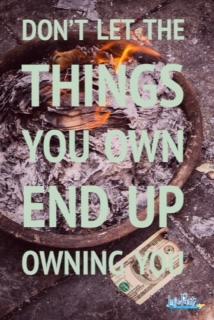Last Updated on January 19, 2023 by Sarah Wilson
If you pay close attention to television commercials or online ads, you will notice that the premise of almost all of them is deceiving. Advertising suggests that if you buy the right car, a bigger house, a new pair of shoes, (or even the right deodorant or prescription drugs,) life will be safer, more secure and all delight and sunshine.
This push toward blind consumerism ignores a well known, but rarely acknowledged truth: the things you own end up owning you.

From birth, we are taught to become good consumers. I don’t mean personally “good” in the self-aware, knowledgeable, environmentally friendly sort of way that benefits you and the planet. I am talking about “good” in the impulsive sort of way that benefits the people trying to sell you things.
Once, by using their instinct for manipulating the human psyche, and now by using “big data,” marketers and manufacturers have learned how to manipulate our desires, insecurities, and fears, and use them to take money from our pockets and put it in theirs. Their tactics manipulate the human desire for security and happiness, to get us to buy their products instead of doing things that could actually improve our lives.
It is a fact of life that in modern society we do need some money to buy some basics. But, studies have shown that purchasing unnecessary things, after the momentary thrill of acquisition is gone, moves us further away from sustainable happiness.
When we use credit for big, unnecessary, purchases we inevitably find ourselves mentally in the same spot as before, but deeper in debt and even more restricted. Again, the things you own end up owning you.
Before I retired, I discovered how easy it is to be owned by things. I used to buy things thoughtlessly, just because I felt the need. A little voice in my hard would say, “Go ahead, you work hard, you deserve it.”
So, I would make the purchase without thought of the consequences. I didn’t account for the debt. I didn’t account for the guilt that would follow when the newness wore off and the item, that was once a thoughtless indulgence, would sit in the corner gathering dust while it stared at me as I moved on to the next shiny thing. The things I owned were owning me.
And I wasn’t alone. Almost everyone I knew bought things in this way. If someone bought a new car, everyone in our peer group started shopping for new vehicles. Bigger houses, the latest electronics, a boat, a better set of golf clubs, it would almost become a competition. We weren’t rich in any sort of epic way, but we all felt we deserved more than our peers and by damn we weren’t going to let anyone get ahead of us. Even if we had to go into debt to keep up.
There is even a scientific term for the tendency of people to return to the same level of life satisfaction that they had after a life event: Hedonic Adaptation. We know through experience that soon after making a big purchase, we get used to having the new thing and soon start shopping for something else.
No matter what we told ourselves when we bought it, washing the car we have had for a few years doesn’t bring the pleasure washing it did when it was shiny and new.
We have adapted to the new car, it has become the norm in our lives, and our level of happiness returns to what it was before we bought the car. But, even as the payments go on and on, we find ourselves willingly shopping for the next new thing and repeating the process.

For me, the end of this cycle came when I realized that having new experiences brought me more joy than buying new stuff. I was approaching a chance for early retirement, but my stuff and my buying habits were restricting my ability to focus on the big picture.
Potentially, the time and freedom to live my dream was upon me, but, it was not going to be possible to have the experiences I craved if I continued to cling to my stuff.
See also:
- Non-Financial Tips to Enjoy Your Retirement
- When is the Best Time to Retire?
- Taking a Leap of Faith
- The Things You Own End Up Owning You Essay
- Essentials Required for Retiring Overseas
- Why No-one Cares About Your Travels
- When Enough Is Enough
- The Good Enough Retirement
- Happy Retirement Wishes
- Life Is Either A Daring Adventure Or Nothing At All
Once your basic needs are taken care of, happiness is not something you can buy. Happiness is a state of mind, a place within yourself, not something you can find on a shelf somewhere else and put in a shopping bag.
The journey to happiness is different for everyone, but it requires work, and you can’t achieve it (or mask unhappiness) by surrounding yourself with more and more stuff.
People like to talk about the importance of “freedom” in their lives, then they go and buy more stuff that limits their options. They buy bigger houses that tie them to bigger mortgages. Just for the thrill of it, they buy toys they will soon put aside.
They accumulate more and more stuff for no better reason than they feel the need to buy something, without consideration for the obligations that unchecked consumerism causes them.
We all complain about the time we spend doing the thankless chores required to maintain our stuff. We all complain when the bills come due for the insurance, maintenance or repairs that our stuff needs.
Peripherally, we know that buying cool stuff doesn’t bring happiness, but it seems like madness, or a betrayal of cultural norms when someone does the logical thing and says “enough.” In other words, the things you own end up owning you.








Sage points there Jonathan, apart from food, drink and a few basics we generally avoid buying anything unless it’s going to be useful or to replace something worn out. I always remember my mother saying that if you believed all the adverts you’d soon be broke !
Thanks, Ben! In he end, it is the experiences that matter. Over a certain point, when you have more stuff than you can possibly use, your things become burdens you have to care for.
An excellent and very valuable article that everyone should read. I am forwarding this to my kids to read. My favorite part is: “We have adapted to the new _____, it has become the norm in our lives, and our level of happiness returns to what it was before we bought the _____.” This is such a critical point, about how for purchased items, our level of happiness goes back to what it was before.
I am new to your blog and totally agree with everything that I have read.
Thanks Peter. You come face to face with how much you sacrifice your time, for what ultimately turns out to be nothing, when you decide to get rid of everything and examine how you used consumerism for no better reason than that momentary thrill of acquisition.
I think this is a good article for your Forbes column…. I try to make myself look at new & shiny things in terms of a comparison to airfare, or hotels in some place I’m eager to go. It’s prevented a few unneeded luxuries in favor of an experience in an intriguing locale.
Thanks Ann. I think I should touch on this as well.
Just ran across your blogs as I was googling Helen Keller’s quote. Nice! Fits my beliefs and life stage, and they seem to reinforce my desire to do those things that I’ve put off for too long! Thank you.
Thanks Roberta! It has made a big difference in my life.
I couldn’t agree with this more. I realized this a few years after leaving the US and turning off my TV. I really need very little to be happy!